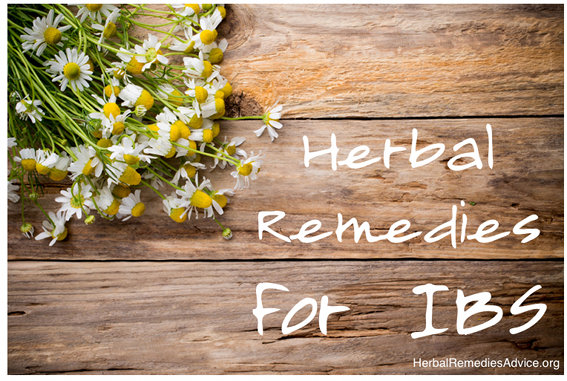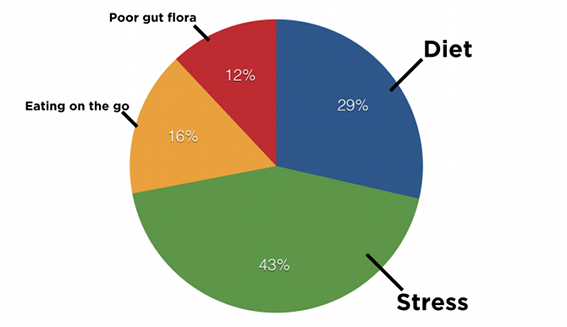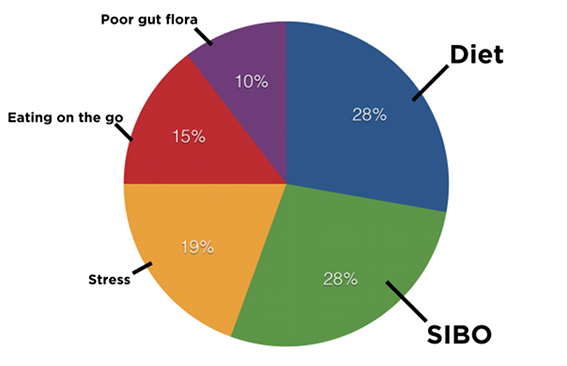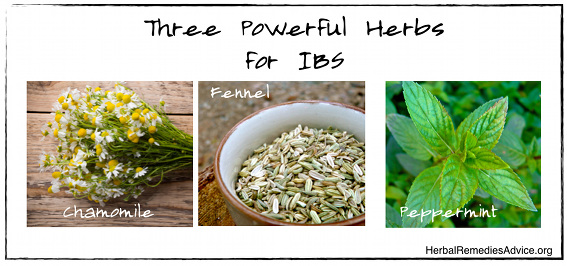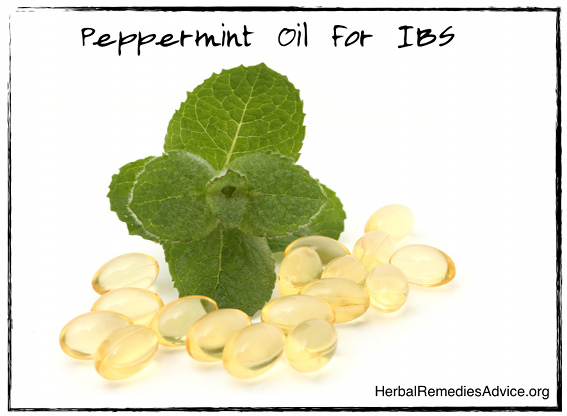Get weekly tips, recipes, and my Herbal Jumpstart e-course! Sign up for free today.

Herbal Remedies for IBS
Share this! |
|
|
People commonly assume that using herbal remedies for IBS is as simple as substituting herbs for pharmaceuticals. However, as we’ve seen in parts 1-3 of this series, it’s more important to choose herbs for the individual rather than the disease. Are you wondering what is the single best herbal remedy for IBS? I wish it could be that simple! But, in order to choose the most effective and safest IBS natural remedies you have to choose them specifically for the person. |
In part one of this series I discussed, “What is IBS?” and showed how western medicine (by its own admission) doesn’t have a cure or solution for this problem.
In part two of this series I discussed “Help for IBS” and explained how holistic health begins by understanding the underlying reasons for the digestive distress.
In part three I discussed an “IBS Diet” and how important food choices are for someone diagnosed with IBS.
In future parts of this series I’ll look at probiotics for IBS and Solutions for IBS with Constipation
In this fourth article we will specifically look at herbal remedies for IBS.
Do You Have a Hot or Cold Digestion?
One of the first things I want to do as an herbalist is determine if you have a hot or cold digestion to see if that is playing a role in your digestive complaints.
Herbal theory thinks of digestion as a metabolic fire. If you imagine an actual fire, then ideally we want one that is burning well. We don’t want a smoldering fire and we don’t want a raging fire that burns itself out too quickly. Like Goldilocks, we’re looking for something just right.
Cold Digestion
People with what we call “cold digestion” may have the following symptoms:
- stagnant digestion
- bloating
- belching
- sour regurgitation
- nausea
- foul breath
- gas
- lack of appetite
- loose stools
- undigested food in stools
- difficulty digesting fats
- heartburn
- feeling of coldness in the limbs or in the stomach
- tongue is swollen and wet with possible heavy white coating
- abdominal pain that is relieved with pressure
People with cold or deficient digestion will most benefit from warming digestive herbs. (See the list of carminatives below).
Hot Digestion
People with too much heat in the digestive tract may have the following symptoms:
- Heartburn
- Red sores in the mouth
- Excessive appetite
- Excessive thirst
- Constipation
- Bitter taste in mouth
- Hemorrhoids
- Strong odors
- Scanty dark urine
- Red Face
- Yellow coating on tongue
- Red eyes
- Abdominal pain that is exacerbated with pressure
People with heat in the digestive tract will benefit from more cooling and bitter herbs. However, we don’t ever want to over-do it with cooling therapies. Digestion should have some fire to it. If you have raging digestive fire you want to cool it down gently. You don’t want to throw a big bucket of ice water on it that leaves a smoldering fire it its place.
Know the Person! And the Possible Root Causes
I know I sound like a broken record here but it’s imperative to really know your specific underlying causes. You may have IBS symptoms that are strongly triggered by stress. In that case relaxing nervines will be more important for you.
Or you may have a bacterial infection in your small intestine (see more information on SIBO in the Help for IBS article). In that case antimicrobial herbs will be more important.
Rarely is it the case that there is simply one underlying cause. Someone could have stress and SIBO as major contributing factors. A holistic health practitioner will take this into account and create a formula or plan that meets the needs of the individual.
I often think of this in terms of a pie chart. Below is an example of someone who may have stress as a major factor contributing to their IBS symptoms. It’s not the only factor, but it’s the main one.
This person will find the best results with a plan that really focuses on relieving stress.
Someone else may have a number of contributing factors.
In this case I would create a plan that makes sense for the person in terms of getting the most results and compliance. This person has a lot of areas we could focus on but I wouldn’t want to give an overwhelming number of IBS natural remedies.
Herbal Remedies for IBS
The following herbal categories are a good place to start when matching the person to IBS natural remedies.
Relaxing Nervine Herbs for IBS
Stress can be a major underlying cause of someone’s IBS symptoms. Relaxing nervine herbs help to relieve acute stress. They may work in a variety of ways (many of which we don’t understand.) In essence they help the body to switch from the sympathetic nervous system (fight or flight) to the parasympathetic nervous system (rest and regenerate). Your body doesn’t prioritize digestion when it is operating in its sympathetic nervous system. It’s only when the parasympathetic nervous system is activated that good digestion results.
Carminative Herbs for IBS
Carminative herbs include many of our delicious aromatic culinary herbs. This includes rosemary, thyme, cumin, coriander, cinnamon, ginger and many more. These herbs warm up digestion, increase digestive enzymes and promote regular peristalsis. This decreases bloating, gas and constipation.
Depending on the person, slightly warming herbs such as coriander may be beneficial or more heating herbs such as dried ginger and black pepper may be used.
Antimicrobial Herbs for IBS
If SIBO is diagnosed then antimicrobial herbs could be a healthy and effective substitute to antibiotics. We live in an age of antibiotic-resistant super bugs that are emerging from western medicines over-dependence on antibiotics. That would be reason number one to avoid antibiotics if possible.
Reason number two is that antibiotics can create more problems than they solve. Since they don’t differentiate between healthy gut flora and pathogenic bacteria they wipe out everything, leaving you with a poor healthy gut flora (a major underlying cause of IBS). I’ll write more about a healthy gut and probiotics in the next article in this series.
Bitter Herbs for IBS
Bitter digestive herbs are beneficial for practically everyone but can be especially helpful for people looking for IBS natural remedies. Bitter herbs promote healthy digestive enzymes such as saliva and HCL. They promote bile production and the release of bile from the gallbladder, both of which help to digest fats. Through various mechanisms the bitter taste also promotes regular and natural peristaltic movements in the colon (IBS is sometimes called the spastic colon disease).
Because bitter herbs are cooling they can be especially indicated for people with digestive heat, although everyone can benefit from the bitter taste, especially when it is formulated with warming and carminative herbs or foods.
Laxative Herbs for IBS
If you have constipation-dominant IBS then laxative herbs can be a short-term relief while you are working on the underlying causes. I’ll look at solutions for IBS with constipation more closely in a later article in this series.
Peppermint Oil for IBS
|
Peppermint oil is famously used for people with IBS symptoms. Numerous studies have shown it to decrease many symptoms that people with IBS experience, most notably bloating and cramping. When looking for a peppermint oil product be sure to get one that has enteric coated capsules. As always, look for a respected brand to avoid products that contain cheaper adulterated oils. |
Summary of Herbal Remedies for IBS
Choosing IBS natural remedies isn’t as simple as saying “take this one herb for IBS”. Instead I want to take a holistic approach so I can use herbs and other natural therapies to address the root cause of the person’s problems. When we use herbs to solve the reasons you are having IBS symptoms, then you can truly move forward with your health.
Next we'll look at Probiotics and IBS.

Rosalee is an herbalist and author of the bestselling book Alchemy of Herbs: Transform Everyday Ingredients Into Foods & Remedies That Healand co-author of the bestselling book Wild Remedies: How to Forage Healing Foods and Craft Your Own Herbal Medicine. She's a registered herbalist with the American Herbalist Guild and has taught thousands of students through her online courses. Read about how Rosalee went from having a terminal illness to being a bestselling author in her full story here.
